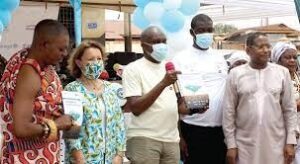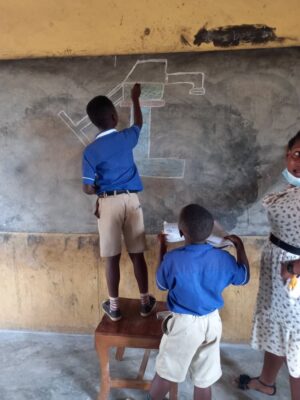Ghana joined the international community to celebrate World Water Day on the theme: “Groundwater – Making the invisible Visible.” At a national durbar to crown the celebration, the main speakers agreed that the contribution of ground water to national social-economic development should be recognised and valued.
They underscored the use of groundwater as critical to maintaining safe drinking water, food and energy security, and its sustainable management as one sure way to adapt to climate change and address poverty.
The climax durbar, took place at the premises of the Dodowa Presbyterian Basic “2” School, in the Shai Osudoku District of the Greater Accra Region.

Take home messages
The clear take home message from the durbar was the urgent need for the country to address the sources of ground water contamination, which threaten the full potential of the resource. Also highlighted was the need to enforce the Drilling Licence and Groundwater Development Regulations, 2006 LI 1827 to regulate groundwater exploitation, as a means to check the proliferation of exploitation of the resource for individual household water supply and for small to large scale commercial bottled water production.
In her keynote statement, Minister for Sanitation and Water Resources, Madam Cecilia Dapaah called for a recognition among Ghanaians that “our actions are polluting and degrading our surface water resources, and our inactions in addressing the matter, have profound impact on our groundwater resources.”
She listed the threats to groundwater as including: illegal mining activities, deforestation, pollution from both liquid and solid waste disposal, and poor land use activities such as uncontrolled sand winning, saying, “these have deteriorated water quality and degraded water sources, thereby affecting the ability of surface water to recharge and protect aquifers for the needed groundwater.”
The address, which was read on her behalf by the Ministry’s Director for Water, Donnan Tay, said government sees the issue of making groundwater visible as strategic, and has accordingly prioritised the realization of responsive groundwater polices, actions, and services to enhance economic activity, and promote groundwater sustainability.
The strategic priorities include: improving the knowledge base and understanding of the hydro‐geological setting in Ghana for reliable groundwater resources information to support domestic water supply, agriculture, industry, tourism, trade and commerce. Also, polices and regulations will be strengthened for the protection and long‐term sustainability of groundwater under an integrated water resources management framework.
Madam Dapaah said groundwater could further be made visible in Ghana, by sharing relevant information and creating awareness about the dynamics in relation to supply or recharge; and demand or abstraction for people to fully understand how groundwater works in terms of storage and depletion.

She explained that accountability will be translated into the groundwater visibility processes, by emphasizing the economic benefits and the costs or consequences of use, such as the impacts of poor drilling and borehole construction norms and standards. One major groundwater visibility strategy for Ghana will be – the protection of sensitive ecosystems like wetlands, which form part of the natural processes for groundwater recharge and water quality improvement.
In a message delivered on her behalf, the MP for Shai Osudoku, Linda Obenewaa Akweley Ocloo urged Development Partners and NGOs to continue their services in providing water for the underserved and unreached areas in the country. She said while underground serves as a good source of water for many in rural communities, in other places, ground water may not be the best alternative because of high contamination.
The Paramount Chief of Dodowa, Numersi Mantse, Nene Okrukrubour Tei Kwesi Agyemang V, was the Chairman for the event. He called on the general public to use ground water sustainably and protect the resource from pollution.
Commenting on the celebration in an interview, the WASH Technical Coordinator of World Vision Ghana and President of the Coalition of NGOs in Water and Sanitation (CONIWAS), Atta Arhin stressed the need to protect ground water resources against climate change impacts. He said in view of the increasing challenges, the nation needs to begin exploring and investing in alternative water supply technologies in order to reach everybody everywhere with safe drinking water.
Messages from the UN System
The message of the UN Secretary General, António Guterres to mark the Day, was contained in the address of the UN Resident Coordinator in Ghana, Mrs. Anne-Claire Dufay. The Secretary-General expressed concerned about the mounting pressure on water access: “Humanity’s demand for water is growing. Pressure on water resources is increasing due to overuse, pollution and climate change.”
His message reminded the world that because of its critical role in sustaining human lives, people need to keep groundwater in view, even though it is not visible: “Groundwater is out of sight, but we cannot afford for it to be out of mind… It sustains drinking water supplies, sanitation systems, farming, industry and ecosystems. Yet, some 20 % of the world’s aquifers are being overexploited.”
For her part, Mrs. Dufay noted that while, Ghana has immense ground water potential, only an estimated five percent of the annual recharge potential is used each year mainly for domestic purposes in rural areas and small towns. She stated that this situation signifies the importance of regulating, protecting and harnessing ground water effectively in Ghana.
Mrs. Dufay also touched on the close collaboration between the UN Country Team and the Government of Ghana on many initiatives. She cited the example of how UNICEF has strengthened systems and supported the modeling of service delivery in some of Ghana’s most deprived rural communities, including schools and health facilities.
UNESCO Representative to Ghana, Mr. Abdourahamane Diallo, emphasized the critical role groundwater plays in the fight against poverty. “Groundwater is an important resource in our fight against poverty and for the creation of decent jobs,” adding, “groundwater can ensure the resilience of societies and economies to climate change. It also plays an essential role in sustaining healthy ecosystems.”
He explained that groundwater contamination usually impacts marginalized people – mostly women and girls who are often disproportionately more at risk of disease due to pathogens and toxins, because of their exposure to wastewater.
Therefore, Mr. Diallo was of the view that the shared well-being of groundwater, ecosystems and humans may be enhanced by groundwater management, conjunctive water and land management, nature-based solutions, and improved ecosystem protection.
On the issue of the water crisis facing humanity, he declared: “…it is real!” but believed that “the crises could be avoided if we work together to better protect and manage our groundwater resources, since improved groundwater management and governance are needed in order to avoid overexploitation and contamination.”
Mr. Diallo assured the sector Ministry and other partners, of UNESCO’s preparedness to support Ghana through water education and capacity development for improved water management.
Launch of the UN World Water Development Report
The occasion was also used by Ghana to join the global community to launch the latest edition of the “UN World Water Development Report,” which according to UNESCO’s Director-General, Ms Audrey Azoulay “…is shining a spotlight on groundwater, underlining its roles, benefits, challenges and opportunities.”
In a message to commemorate the occasion, she stated that in a world of ever-growing demand, where surface water resources are increasingly scarce and under more and more stress, the value of groundwater needs to be recognized by everyone – “and UNESCO is fully committed to this goal.”
Celebration Report from outside Accra
In other parts of the country including Eastern and Oti Regions, offices of the Ghana Education Service (GES), participated in observing World Water Day 2022, by organizing talks, drawing competitions, quizzes and clean up at borehole sites for pupils and students of basic schools.










